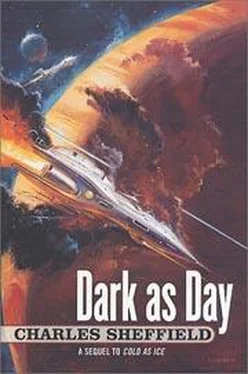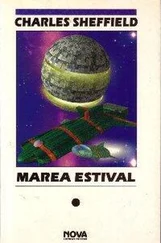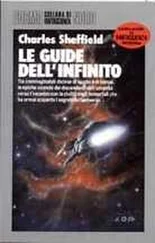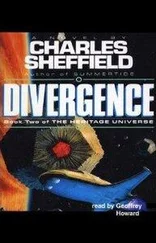Sebastian said, “It will rain hard in a few minutes.”
Valnia Bloom seemed skeptical, and looked up at the cloud-barred sky. Janeed wondered, had the woman ever seen rain? It certainly didn’t rain water on Ganymede, or anywhere else in the Outer System. On Venus it rained sulfuric acid, and on Titan it rained droplets of hydrocarbons. On Triton, Janeed had read, there were geysers of liquid nitrogen, but they hardly counted as rain. Sebastian was staring vacantly at Valnia Bloom, who finally said, “We’ll see about the rain. Go ahead. Keep it short.”
Jan stated daggers at Sebastian. Her look said, Talk! After a long silence, she felt that she had to go on. “Well, most of the onshore fossil fuels of Earth were always in the northern hemisphere, which is still uninhabitable. The coal under the Antarctic ice-cap is inaccessible, too. But the southern hemisphere is booming, and there’s a big need for energy and plastics, and no way to satisfy it.”
“I thought that Cyrus Mobarak had solved your energy problem, with the Moby Midget fusion reactors.”
“He did, for anything that can handle eight megawatts and up. But there’s a need all over the developing southern regions for small, portable units that generate only a few kilowatts. That’s what that provides.”
Jan gestured to the extractor, sticking up from the middle of the GM platform, and the pipeline running away to the southwest. Dr. Bloom stared at it uncomprehendingly.
“Methane,” Sebastian said, a split-second before Janeed felt she would be obliged to jump in again. Thank God, a word at last! But apparently that one word was all they would get. Jan finally added, “Methane down on the seabed. Trillions and trillions of tons of it.”
“But methane is lighter than water. In fact” — Valnia Bloom was frowning, in the effort of recollection — “the atmosphere of Earth is mainly oxygen and nitrogen. Methane is a lighter gas than either one of those. It can’t possibly be found down on your ocean floor.”
“Oh, it’s not. I mean, it is, but it’s not stored in gaseous form. It’s stored as methane clathrates — a structure that has four molecules of methane locked into a stable form with twenty-three molecules of water. At the temperatures of the deep ocean, around four Celsius, methane clathrates are solids. And they’re denser than water, so if they form on the ocean bed they won’t float up to the surface. And everything that sinks down from the surface of the sea decays and rots, and produces methane.”
Dr. Bloom looked less than thrilled by that vision of universal rot and corruption, a phenomenon unique to Earth, Other worlds, her expression suggested, kept their decay and recycling well away from civilized life; but she nodded and Jan went on, “So with all that methane from decomposition, plus naturally upwelling primordial methane, the seabed contains enormous amounts of it. And of course there’s loads of water. So we have these enormous clathrate beds, hundreds of kilometers across and tens of meters deep. All we do — all that does” — she pointed to the extractor — “is run the spine down to the clathrate beds and warm them up a bit. The methane is released in the higher temperatures, and rises to the surface, and flows away through the pipeline.”
Their interviewer was pleased. For the first time she was smiling. Dr. Bloom said, “So you’re miners. Yes, I guess that you are.”
“And you know,” Jan went on, “now that I think of it, I bet the same method would work for the Europan ocean. There’s life, there’s decomposition, there’s plenty of water.”
That was less of a success. The smile became a fixed and very starchy frown. “I thought that it was well-known, even in the Inner System” — her tone implied, the primitive Inner System — “that Europa is off-limits. Native life was discovered there five years ago. We do not care to have the only other known life form in the Universe contaminated for minor industrial gain.”
Sebastian opened his mouth. He was going to choose this worst moment to argue with the interviewer, Janeed felt sure of it. That would cancel out any good impression they had made. She could think of no way to cut him off, until like a gift from Heaven she felt two heavy raindrops strike her on the left cheek and square on the nose.
“Here it comes,” she said, “just the way Sebastian said it would. Let’s get below, before we’re all soaked.”
And maybe on the way I’ll have a chance to get you to one side, you moon-faced lump, and say that talking about the wrong things is worse than not talking at all.
The best-laid plans…
Dr. Valnia Bloom stuck to Sebastian, tight as a vacuum seal, all the way below until the three of them were packed into the tiny room that served as the junior crew hideaway.
Apparently the interviewer had reached a new point on her agenda, because she listened in silence to an internal prompt, opened a file, and pushed it forward.
“These yours?”
“Yes.” Janeed recognized her own test answers, to both the standardized question set and the free-form invitation to pick a subject and work it through. She had taken a chance, reviewing the growth of the economy of the Jovian moons since first colonization, then using that to make projections on Saturn and Uranus system development.
She expected at least a comment, but Dr. Bloom merely grunted, picked up a second file, and laid it in front of Sebastian.
“And this is yours?”
He peered, as though he had never seen the file in his life, then nodded. “Yep. That’s mine.”
Sebastian nodded. Janeed winced, she hoped invisibly. It was the standard question set, and a quick glance was enough to show that at least half had been left blank.
“How about these?”
This time it was half a dozen sheets. They showed not writing or numbers but drawings, black-and-white sketches with the unfinished look of something done at high speed. They were — Janeed ought to have guessed it — cloud formations, whorls and bars and herringbone patterns, mixed together with no apparent logic.
Sebastian took his time, stared, and at last said, “Yep. Didn’t have time to finish this one.” He pointed at a swirl like the image of a moving hurricane, spinning off smaller whorls from its trailing edge.
“They resemble storms on the face of the planet Saturn. Did you base what you drew on something you had seen?”
“Yep. There’s a regular vid feed, images from Mars and Jupiter and Saturn. I watch them. Uranus, too, though there’s nothing to see there.”
“You mean no cloud patterns.”
“Smooth as a billiard ball.”
“But you didn’t just copy these from the latest video feed.”
Sebastian frowned. “No. Didn’t copy them.”
“So where did you get them? I assume that you took the tests under controlled conditions.”
“We did.” Jan was not being spoken to, but she couldn’t keep quiet. “No one could come or go, no one could look at what anybody else was doing.”
Valnia Bloom ignored her. “Where did you get these drawings, Mr. Birch?”
Sebastian cleared his throat. “Well, I seen Saturn pictures on the vid feed. And these ones, I like dreamed, the way you do when drawing goes good.”
If Janeed’s wince had been invisible before, she was sure it wasn’t now. Fortunately, Dr. Valnia Bloom seemed to be taking no interest at all in what Janeed did — until she raised her head and speared both Sebastian and Janeed with a single glance.
“Your application was a rather unusual one. You are both over thirty, much older than our norm. Also, you asked to be considered as a team, but not singly.”
Jan nodded. “Yes, ma’am.”
“And that is still your position?”
Читать дальше












